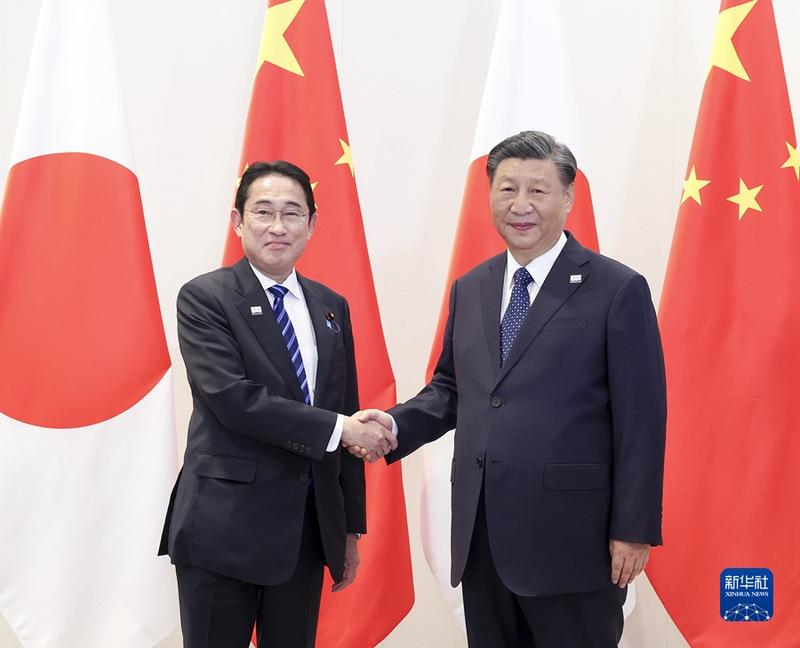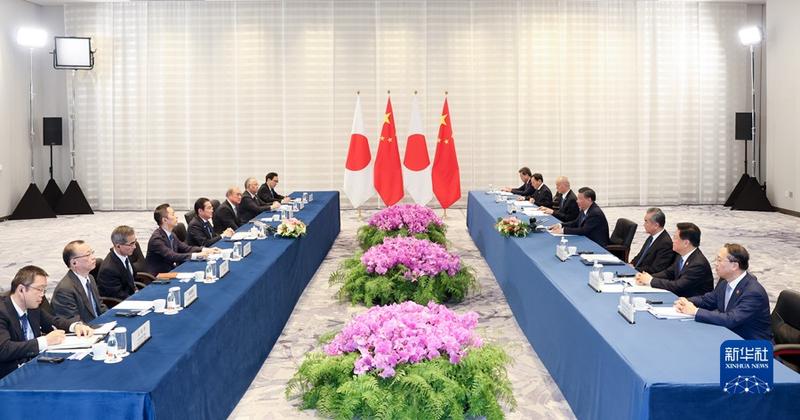 Chinese President Xi Jinping (right) and Japanese Prime Minister Fumio Kishida shake hands as they meet in San Francisco, the United States, on the sidelines of the 30th Asia-Pacific Economic Cooperation Economic Leaders' Meeting, Nov 16, 2023. (PHOTO / XINHUA)
Chinese President Xi Jinping (right) and Japanese Prime Minister Fumio Kishida shake hands as they meet in San Francisco, the United States, on the sidelines of the 30th Asia-Pacific Economic Cooperation Economic Leaders' Meeting, Nov 16, 2023. (PHOTO / XINHUA)
SAN FRANCISCO/TOKYO – Chinese President Xi Jinping and Japanese Prime Minister Fumio Kishida on Thursday reaffirmed the positioning of comprehensively advancing the strategic and mutually beneficial relations between the two countries.
Meeting on the sidelines of the 30th Asia-Pacific Economic Cooperation Economic Leaders' Meeting in San Francisco, United States, the two leaders reiterated their commitment to the principles and consensus stipulated in the four political documents between China and Japan.
They reaffirmed the positioning of comprehensively advancing a mutually beneficial relationship based on common strategic interests and agreed to dedicate themselves to jointly building a constructive and stable China-Japan relationship that meets the demands of the new era.
READ MORE: China, Japan mark 45th anniversary of friendship treaty
Xi told Kishida that the two countries should view each other's development objectively and rationally.
Pointing out that the China-Japan relationship is at present at a critical juncture of connecting the past with the future, he urged the two sides, in the spirit of taking history as a mirror, to open up a brighter future, to cling to the original aspiration when normalizing diplomatic relations in 1972, foster positive and friendly mutual cognition, and manage differences in a constructive manner.
Political foundation of Sino-Japan ties
Major issues of principle related to history and Taiwan bear on the political foundation of China-Japan relations, the Chinese leader said, urging Japan to keep its word and stick to the principle.
He also emphasized that Japan must ensure that the foundation of bilateral relations will not be damaged or shaken.
ALSO READ: China, Japan reach win-win consensus on peace
 Chinese President Xi Jinping (fourth right) holds a meeting with Japanese Prime Minister Fumio Kishida (fifth left) in San Francisco, the United States, Nov 16, 2023. (PHOTO / XINHUA)
Chinese President Xi Jinping (fourth right) holds a meeting with Japanese Prime Minister Fumio Kishida (fifth left) in San Francisco, the United States, Nov 16, 2023. (PHOTO / XINHUA)
‘Small yard, high fence’, ‘decoupling’
The economic interests of China and Japan, as well as their industrial and supply chains are deeply intertwined, Xi told Kishida, adding it is in no one's interest to engage in "small yard, high fence" and "decoupling and breaking chains".
Nuclear-contaminated water
The Chinese leader urged the Japanese side to properly handle the discharge of nuclear-contaminated water from the Fukushima power plant in a responsible and constructive manner.
The issue concerns the health of all humankind, the global marine environment, and the international public interest, he said.
Xi also called on Japan to take seriously the legitimate concerns at home and abroad on the issue.
The Japanese media said the promotion of the strategic and mutually beneficial relationship was reaffirmed and a mutual understanding was sought to pave the way for a new era in Sino-Japanese relations at the meeting between the two leaders.
“Additionally, it is reported that both sides acknowledged the differences in their positions on issues of common concern. Through dialogue, they aim to find solutions to these issues. These developments are seen as positive and welcomed by Japan’s business community,” said Takeo Donoue, executive managing director of the Japan-China Economic Association.
“The exchange between the top leaders has been a sought-after initiative, and it is expected that it will have a positive impact on bilateral relations, including economic exchanges,” said Donoue.
READ MORE: Japan, China urged to pass down spirit of friendship, cooperation
He emphasized that both Japan and China consider it important to build the bilateral relationship in the new era while maintaining the commitment to the fundamental principles agreed upon in the past decades.
“From the perspective of economic entities, it is expected that transparent and fair business environments will be developed through exchanges of opinions at various levels,” he said.
“This is particularly crucial for advancing exchanges in areas such as green economy, healthcare, and caregiving.”


